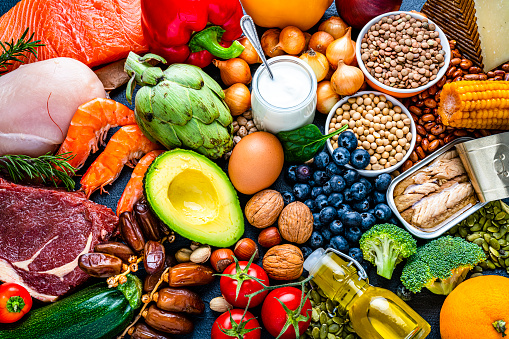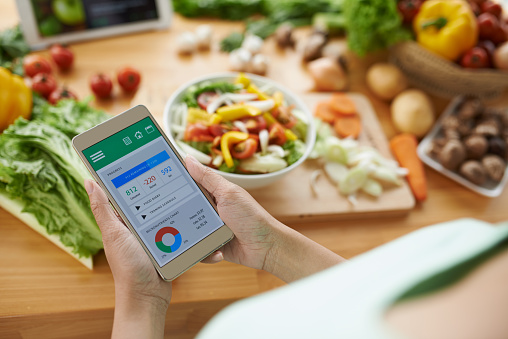6 Myths About Flexible Dieting that Need Debunked
Today I thought it would be fun to do some macro tracking myth-busting. As a Registered Dietitian I can get a bit fired up when I hear others throw insults at macro-tracking for treating it like it’s some fad diet when in reality it’s a form of self-monitoring what you eat.
The practice of self-monitoring whether it be your weight, your daily step count, or what you eat on a day to day basis has been shown to be one of the most effective techniques for not only losing weight but keeping it off.
According to the National Weight-Control Registry which includes over 10000 individuals who have lost an average of 66 pounds and kept it off for 5 years on average, frequent self-monitoring is a common behavior shared by those who have continued to maintain their weight-loss (1). Now, I’m getting ahead of myself - but in no particular order, let’s chat about some of the most common misconceptions when it comes to food tracking for weight-loss.

1. Tracking Your Foods Is Obsessive Behavior
Any tool to improve your health can be misused. If you have an obsessive personality you might be more prone to obsessing over hitting certain food logging metrics like your calorie goal or protein goal. But it doesn’t necessarily mean that anyone who tracks their food is going to develop an unhealthy obsession with it or worse an eating disorder.
While tracking your food can be a behavior of those with eating disorders it does not mean that tracking your food leads to disordered eating (2). In fact, as someone who previously had an eating disorder - I can tell you that at the time I was engaging in disordered eating I never logged a single food in an app. However, when a therapist introduced me to intuitive eating and recommended I eat according to ‘the hunger and fullness scale’ I then hyper-fixated on if my stomach felt too full or not.
The point I’m making here is NOT that the hunger and fullness scale is a terrible tool but that ANY tool can be misapplied - it all depends on WHO is using it and at what point in their health journey. Today I’m fully recovered from my ED and find that tracking my food doesn’t ‘trigger’ ED behavior but I also understand that for some it may not be conducive to their healthy journey and that’s okay. But to make the claim that ‘tracking your food leads to obsessive behavior or eating disorders’ is absurd.
2. Tracking Your Food Takes Too Much Time
As with acquiring any new skill - there is a learning curve involved with tracking your food. Initially, you’ll have to get acquainted with where different features are located in your food tracking app like the label scan feature or how to enter a custom recipe.
You’ll have questions that might slow down the process like ‘should I log the cooked weight or the raw weight’ or ‘is it necessary to account for the oil I used to cook my vegetables in.’ All of these things will take some time but as the days progress you will become more efficient with food logging. This is because most food logging apps are built to ‘remember’ what you have previously logged making it easier for you to log your subsequent meal.
It takes me about 6 minutes per day to log everything I eat and drink in my app. To put this into perspective, if you spend 5 hours per day on your smartphone device which matches what the average American spends - this would makeup 2% of the time you spend on your device. That said, I don’t think the excuse ‘it takes too much time’ is a good one if you are also spending multiple hours scrolling social media which is what most people do these days.

3. You Have to Hit Your Macros Perfectly To Get Results
You need to be in a calorie deficit at the end of the week to lose weight. Your macro ratios are there to ensure you are getting a balance of nutrients to promote overall health, enhance your performance in the gym, and even optimize your body composition during the weight-loss process.
However, hitting your macro targets perfectly day after day is not necessary for the average person. If you are preparing for a bikini competition or a high-performing athlete that’s one thing - but if you are a stay-at-home mom who simply wants to lose fat and not hate her life in the process that’s another thing. Perfection is not required to get results.
To give yourself the best chance of losing weight, I recommend you first budget your calories, then optimize your protein intake, and let your carbs and fat ratios fall where they fall. Generally doing these two things alone are enough to get you results and don’t require you to obsess over “how you should spend your last 25 grams of carbs and 10 grams of fat left in your budget.”
4. Tracking Your Macros Is Too Restrictive
I hate to break this to you but any diet that puts you in a calorie deficit which IS necessary to lose weight is probably going to feel a bit restrictive at times. Weight-loss requires making trade-offs. You might need to eat a smaller portion of French Fries when you go out to eat in order to stay within your calorie limits. You might need to start swapping out your daily sodas for sparkling water.
There are going to be compromises that need to be made to lose weight and ultimately keep it off. Yet, one could argue that tracking your macros is one of the LEAST restrictive ways to lose weight because you are still permitted to eat the foods you love.
Unlike keto which severely restricts your carb intake, or Whole30 which prohibits you from having a long list of food including alcohol, dairy, grains, legumes, added sugar and more - there are no foods off limits when implementing a flexible dieting/macro tracking approach.
For this reason I find that tracking your macros actually provides a higher level of food freedom than most strategies. You have nutrition guardrails or goals to guide your choices but ultimately you have the autonomy to decide what foods can work within those parameters.
5. You Can't Have a Social Life If You Track Macros
Contrary to popular belief you don’t have to subsist on your pre-portioned food packed inside Tupperware containers to be successful with tracking. Flexible tracking is all about providing you (you guessed it) flexibility with your food choices. This applies to not only what you choose to eat but where you eat!
You CAN go out to happy hour with your girlfriends, grab a latte from Starbucks, or even sit down to a fancy steak dinner with your significant other and enjoy yourself.

While you may not be able to track as accurately when eating away from home, you can still do your best and estimate what you ate.
Will every restaurant have nutrition information available? No.
Will you have your food scale and measuring cups handy? No (Ps. please leave them at home)
Will you always know what goes into a special sauce or hand-shaken cocktail? No.
Yet, don’t let these things hold you back from living your life. There are plenty of ways you can stay on track with your nutrition goals when it comes to dining out. It just requires a bit more forethought and planning ahead.
As I tell my clients, do your best to estimate what ate while dining out but don't obsess about it being perfect. Logging something is always better than logging nothing.
6. You Will Have to Weigh & Measure Your Food Forever
The goal of food tracking isn't to be glued to your tracking app and food scales forever. It's meant to help you achieve a certain goal like weight-loss or building muscle AND in the process build a strong foundation of nutrition knowledge while learning more about what your body needs.
The intention behind tracking isn’t to passively log your foods but to use the data to understand the nutritional composition of various foods. No one learns about nutrition in school unless of course you become a dietitian like myself. Therefore, one of the best ways to educate yourself about macros and micros (vitamins and minerals) is to start reflecting on your food logging data and let it inform your decisions.
Overtime, you will not only learn about nutrient density but what portion sizes are appropriate for your body. My goal as a dietitian is to always help my clients transition away from tracking their foods to a more intuitive eating approach after they have reached their goal and have grasped the fundamentals of good nutrition.
If you are interested in learning about how to use a flexible dieting approach lose weight AND keep it off, schedule your FREE discovery call today to learn more about my VIP 1 on 1 coaching program or my group programs.
Cheers to good health!
Alisa Fields MS, RD, LD
Registered Dietitian